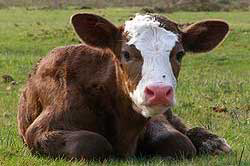Act now to reduce impact of vitamin A deficiency in cattle

Iowa State University Extension and Outreach beef veterinarian Grant Dewell said effects of last year’s drought are evident at the Iowa State Veterinary Diagnostic Laboratory in the form of an increasing number of calves with vitamin A deficiency.
The 2012 drought and subsequent low quality hay supplies for winter feeding mean cows don’t have normal liver stores of vitamin A, and without supplementation cows will potentially be deficient in vitamin A. That can lead to a variety of calf health problems, Dewell said.
“Typically calves have been submitted with a history of being either still born or weak at birth. Some veterinarians have reported blindness, neurologic signs or diarrhea that can also be associated with vitamin A deficiency,” he said. “Severe vitamin A deficiency can result in abnormal bone development in fetal calves. Other calves may be born weak and fail to thrive. Additionally, poor immune function can lead to increased infectious disease incidence.”
Dewell recommended that cows receive supplemental Vitamin A either through oral supplementation or injection of vitamin A. Calves may benefit from an injection of vitamin A at birth and potentially a second dose in two to three weeks, especially if cows have not been supplemented.
For more information, see Dewell’s fact sheet on vitamin A deficiency
Join 26,000+ subscribers
Subscribe to our newsletter to stay updated about all the need-to-know content in the feed sector, three times a week. Beheer
Beheer









 WP Admin
WP Admin  Bewerk bericht
Bewerk bericht